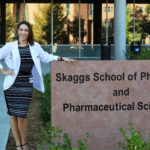Aspirin: Is it right for you?
By Megan K. Fischer with Peter J. Rice
Aspirin is a nonsteroidal anti-inflammatory drug (NSAID) that also thins the blood. It can be used to treat pain, such as headaches, aches, inflammation, and it can also lower cardiovascular risk and the risk of colon cancer. Atherosclerotic cardiovascular disease (ASCVD) can cause events like a heart attack or stroke. Atherosclerosis is the build up of cholesterol in blood vessels that can ultimately lead to blockage of blood flow, which would cause a heart attack, or if the buildup breaks free, could cause a stroke. When a person has ASCVD, the body thinks that there is damage in it, making it recruit platelets to the area of buildup, which in turn can encourage inappropriate blood clotting.
Aspirin works by blocking a step in recruitment of platelets. By stopping this step, it decreases the ability of the body to call platelets to these sites of cholesterol build up, keeping the blood vessel more open.
Who should use Aspirin?
People at a high risk of heart attack, or another cardiovascular event, or who have already experienced an event should take a low dose of aspirin daily (81mg). Aspirin has a lot of evidence supporting its use in patients who have already had a cardiovascular event, such as a heart attack. Taking a low dose of Aspirin daily will reduce the risk of a second event occurring and is currently recommended by the American Heart Association for all patients with Atherosclerotic Heart Disease and Coronary Heart Disease.
Many studies are being conducted to determine whether Aspirin therapy can reduce the risk of an event from happening in patients who have never experienced a heart attack or stroke. Currently, Aspirin therapy is recommended in men ages 45-79 and women ages 55-79 when the potential cardiovascular benefits outweigh the increased risks of bleeding from Aspirin therapy.
The American Diabetes Association and American Heart Association recommend Aspirin therapy for all patients over 40 years old who have risk factors for cardiovascular disease. Risk factors for cardiovascular disease include but are not limited to: cigarette smoking, high blood pressure, high cholesterol, diabetes, obesity, and family history of cardiovascular disease.

Aspirin
Risks of Aspiring therapy
Aspirin has several side effects to be aware of. The main consideration is the increased risk of bleeding that occurs while on the medication. Additionally, Aspirin can cause stomach and intestinal issues. Gastrointestinal bleeding is a major risk to be aware of. If you notice darkening of your stool after initiating therapy, stop taking aspirin, immediately contact your provider and seek medical attention. There is also a risk of hemorrhagic stroke, bursting or leak of a blood vessel in the brain, after initiating Aspirin therapy. Aspirin can also interact with many other medications, so do not initiate an aspirin therapy without discussing it further with your pharmacist or healthcare provider.
Because aspirin thins the blood, it can cause several complications. Talk to your doctor prior to taking aspirin and if any of these situations apply to you. You should not take aspirin if you:
- Have an aspirin allergy or intolerance
- Are at risk for gastrointestinal bleeding or hemorrhagic stroke
- Drink alcohol regularly
- Are undergoing any simple medical or dental procedures
If you experience any heart attack warning signs, call 911 immediately. Do not postpone calling 911. Aspirin will not treat a heart attack by itself. After calling 911, the operator may advise you to take aspirin based on your condition at that time.
The risks and benefits of aspirin therapy vary person to person. Your community pharmacist or prescriber can help you determine if you are a good candidate for Aspirin therapy. Take good care of yourself.
References:
uspreventiveservicestaskforce.org

Megan K. Fischer
About Megan K. Fischer
Megan Fischer is a Doctor of Pharmacy student with University of Colorado Skaggs School of Pharmacy and Pharmaceutical Sciences. A student by day and a workhorse by night, Megan works as a student researcher at her school of pharmacy and as an intern pharmacist at Poudre Valley Hospital. She is an active member of the American College of Clinical Pharmacy (ACCP) and Industry Pharmacists Organization (IPhO). She graduated from University of Colorado at Boulder with a degree in Biochemistry and minored in Chemistry and Economics. Megan plans to work as a clinical pharmacist specializing in critical care or infectious disease after graduation. In her free time, she hikes and camps all the while trying to find moments for a nice nap.











